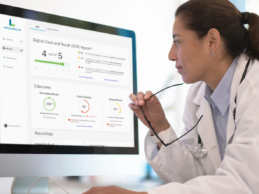What You Should Know:
- Rimidi, a leading clinical management platform designed to optimize clinical workflows, enhance patient experiences and achieve quality objectives, and Boston Medical Center, a private, not-for-profit academic medical center in New England, recently released metrics from an ongoing remote patient monitoring program for new moms at high-risk of postpartum hypertension.
- Of the 1,000 patients monitored, 98.7% submitted at least one blood pressure measurement,
Read More
PhD
Rethinking Custom RTLS: Indoor Positioning Simplified as a Service
For healthcare facilities, real-time location services (RTLS) were initially established on premise for patient safety to later become a priority in mainstreaming operations, improving patient care and experience and employee satisfaction.
Originally introduced to the industry as a security-centric measure to protect newborns, and prevent infant abduction, RTLS was a simple solution that has been effective, and facilities began to see a number of additional benefits. But it required a
Read More
Sibel Health Raises $33M for Advanced Wearable Sensors for RPM
What You Should Know:
- Sibel Health has recently closed a $33M Series B financing round, bringing Sibel's total funding to date to more than $50M.
- In addition, Sibel has announced two new executive appointments. Jon Otterstatter, the former CEO and co-founder of Preventice (acquired by Boston Scientific in 2021), will join as chairman of the board. Matthew Banet, Ph.D., a world expert in advanced body-worn sensors and previously the CTO and co-founder of toSense and Sotera, joins as
Read More
How Medical Researchers Can Leverage Tech to Help Streamline Biospecimen Matchmaking and Procurement
Many medical advancements – from life-saving vaccines and treatments to new diagnostic tests like liquid biopsies – are built on research that involves human biospecimens. Biofluids, tissue and cells are indispensable resources for the medical researcher, yet the process of sourcing these biospecimens can be woefully frustrating and inefficient. These challenges can have a direct, negative impact on the pace of discovery, creating urgency for improved access to the biospecimens researchers need
Read More
3 Barriers to Advance Care Planning for Sexual and Gender Minority People
What You Should Know:
- In a national survey and in interviews, sexual and gender minority people reported experiencing discrimination in healthcare and concerns about support for their end-of-life decisions
- Advance care planning (ACP) can help support patients in making decisions and promoting better care at the end of life. But sexual and gender minority (SGM) patients are likely being left out of conversations around ACP, a new study suggests.
Eliminating Fear and
Read More
Linus Health Launches AI Platform to Detect, Delay Dementia
What You Should Know:
- Linus Health launches the first iPad-based cognitive screening platform able to detect cognitive decline such as dementia years before the human eye could ever do so.
- Linus is now offering a solution to empower PCPs to not only pinpoint cognitive issues in just minutes but also leverage AI to provide patients with evidence-based early interventions
IPad-Based Brain Health Platform
Projections estimate that the number of people in the US with Alzheimer's
Read More
The Mounting Provider Burden of Patients Disconnected from Their Cardiac Implantable Electronic Devices (CIEDs)
The first implantation of a pacemaker in a human occurred in 1958. Since then, the technology behind permanent cardiac rhythm management has steadily evolved, enabling a variety of implants known collectively as cardiac implantable electronic devices (CIEDs). Today, CIEDs are the standard of care for a range of cardiac arrhythmias, and researchers estimate that 1.2–1.4 million of these devices are implanted annually worldwide. And experts predict that number will continue to increase in years to
Read More
Impact of Applying Law of Small Numbers to the Telehealth Industry & Why Its Unsustainable
Driven by headlines and incomplete, misleading data that favor a telehealth narrative, health systems and healthcare investors must start asking "who" is actually supporting waning demand.
The healthcare industry is no stranger to the 80/20 rule. The principle says 80% of an effect is driven by 20% of a cause, and in healthcare, it usually refers to there being a specific cohort of the population (e.g., the chronically ill) driving the majority of care utilization and costs.
More recently,
Read More
COVID-19: Addressing the Urgent Mental Health Needs of Frontline Workers
It is no secret that one by-product of the ongoing pandemic is an exacerbation of the country’s mental health crisis. According to research from Johns Hopkins, one in four Americans experience a mental health disorder in a typical year. Yet among adults in the U.S. rates of depression have steadily climbed from 8.5% before the pandemic to an alarming 32.8% in October of 2021, according to research published in The Lancet Regional Health—Americas.
While it is vital that health systems rush
Read More
How AI Can Accurately Detect Diabetes Through Retinal Images
Recent advancements in AI have demonstrated that AI can accurately detect diabetes through the analysis of retinal images that retina experts would consider healthy. To better understand this achievement, it is worth taking a step back to understand the context and magnitude of the achievement.
Diabetes is a chronic health condition that affects the body’s ability to metabolize glucose, resulting in high levels of sugars in the bloodstream. Over time, elevated blood sugar levels can
Read More










